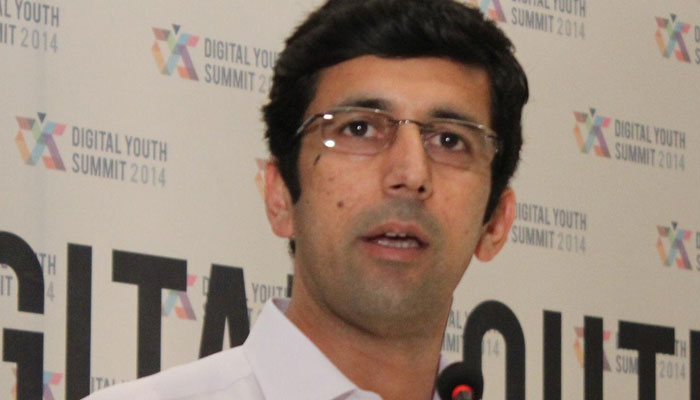Hayatabad incident: Atif, Shahram deny receiving any threat from militants
PESHAWAR: Neither senior Provincial Minister Mohammad Atif Khan nor his relative and cabinet colleague Shahram Khan Tarakai had received any threat from the militants before the April 15 incident in Hayatabad locality in which the police and army personnel killed five suspected terrorists holed up in a house.
A policeman and a soldier were martyred in the 17-hours long encounter in Phase 7 in Hayatabad, a posh residential town located on the edge of the boundary with the Khyber tribal district.
Mohammad Atif Khan, Minister for Tourism, Culture, Sports, Archaeology and Youth Affairs, said he and Shahram Khan Tarakai didn’t receive any threat before or after the Hayatabad incident. “We were not warned by any agency before the incident,” he added while talking to The News.
Atif Khan said after the incident they had a meeting with the Inspector General of Police, Khyber Pakhtunkhwa, Mohammad Naeem Khan, who said they had no report about any specific threat to him and Shahram Khan Tarakai. He felt it was because the two were high-profile and could have been targetted.
Shahram Khan Tarakai, Minister for Local Government, Elections and Rural Development, told The News that he has received no direct threat in the past.
Based on its investigations and following the confessional statement of a detained suspect, Yasir Shams, in the court of senior Civil Judge (judicial) Nasrullah Khan on May 4, the police said the alleged militants had tried to assassinate the two ministers by organising a suicide bombing at an event of the Insaf Students Federation (ISF) at the Bagh-e-Naran in Hayatabad. They claimed the suicide bomber, Imran Mohmand, who was an Afghan national, failed to reach the target after his motorbike hit a car on the way to Bagh-e-Naran. He was later killed in the gun-battle with the cops and soldiers along with the other alleged terrorists Amjad, Murad, Tariq and Feroz Shah.
The outlawed Tehrik-i-Taliban Pakistan (TTP), whose leadership is based in Afghanistan, had claimed that six of its fighters had fought Pakistan’s security forces in Hayatabad, Peshawar for hours and inflicted losses on them. However, certain tribal elders from Bara in Khyber district and the Jamaat-i-Islami’s local leaders had claimed that those killed were innocent and demanded a judicial inquiry into the incident. The police stood by its earlier claim that the slain men were terrorists involved in acts of terrorism, including the failed attempt on February 28 on the life of Peshawar High Court Judge Ayub Khan. It argued that the death of a cop and soldier in the gun-battle with the terrorists and injuries to other members of the law-enforcement and security personnel showed that these men were heavily armed terrorists possessing explosives as well.
The ISF is the students wing of the ruling Pakistan Tehreek-e-Insaf (PTI). Atif and Shahram Tarakai elected to the provincial assembly from Mardan and Swabi, respectively, are important leaders of the PTI in the province and key members of the cabinet. This is the second time they are holding positions in the provincial cabinet.
The PTI has generally escaped the wrath of the militants. While in the opposition, its leader Imran Khan first pleaded for holding talks with the Tehrik-i-Taliban Pakistan (TTP), the umbrella organisation of Pakistani militants, and then backed the military operation, Zarb-e-Azb, launched against the terrorists in North Waziristan in June 2014. After coming into power, the PTI seems to be gradually moving into confrontation mode with the militants, who have splintered into various factions that broke away from the PTI. This could provoke the militants, whose capacity to carry out attacks has diminished due to successive military operations, to start targetting the PTI, particularly its leaders in Khyber Pakhtunkhwa. This may explain, as the police claimed, the plot hatched by the militants slain in the Hayatabad incident to target PTI Ministers Atif Khan and Shahram Tarakai.
The Awami National Party (ANP), a secular and Pakhtun nationalist party with its base in Khyber Pakhtunkhwa, has been the main target of the militants and has lost the highest number of leaders and workers in terrorist attacks.
Among the PTI leaders martyred by the militants were brothers Israrullah Khan Gandapur and Ikramullah Gandapur, both former Khyber Pakhtunkhwa ministers. Israrullah Gandapur was martyred in a suicide bombing in his hujra in his village Kulachi, Dera Ismail Khan while greeting well-wishers on the day of Eidul Azha on October 16, 2013. Ikramullah Gandapur, who won the Assembly seat that fell vacant after his younger brother Israrullah Gandapur’s death and became a minister, also lost his life in a suicide bombing that targetted his vehicle in Kulachi during the July 2018 election campaign. The Gandapur family suspected the hands of its political rivals even though the TTP had claimed responsibility for the attacks by arguing that the suicide bombers were hired for the purpose.
Another prominent PTI lawmaker from Khyber Pakhtunkhwa, Sardar Soran Singh, elected on the reserved seat for minorities, was assassinated on April 22, 2016 in his native Buner district. The police had named a rival minority politician as the main accused in the case.
Farid Khan, who was elected as an independent MPA from Hangu and had later joined the PTI, was gunned down in June 2013 barely a month after the polls. In his case, personal motives were said to have played a role in the fatal attempt on his life.
-
 Prince Harry Considering ‘half-in, Half-out’ Royal Role Amid UK Trip?
Prince Harry Considering ‘half-in, Half-out’ Royal Role Amid UK Trip? -
 CBS Finally Airs Trump’s Full Interview 'pulled' Earlier After White House Threatens To Sue
CBS Finally Airs Trump’s Full Interview 'pulled' Earlier After White House Threatens To Sue -
 Robert Irwin Gets Honest About Being In South Africa After 'DWTS' Run In LA
Robert Irwin Gets Honest About Being In South Africa After 'DWTS' Run In LA -
 Queen Elizabeth’s Icy Response To Andrew, Jeffrey Epstein Scandal Revealed
Queen Elizabeth’s Icy Response To Andrew, Jeffrey Epstein Scandal Revealed -
 Trump Vows To Neutralize ‘Russian Threat’ From Greenland, Raising Arctic Stakes
Trump Vows To Neutralize ‘Russian Threat’ From Greenland, Raising Arctic Stakes -
 Green Day Revealed As Super Bowl 2026 Opening Act
Green Day Revealed As Super Bowl 2026 Opening Act -
 Trump's Greenland Tariff ‘blackmail’ Sparks EU Retaliation: Is ‘trade Bazooka’ Next?
Trump's Greenland Tariff ‘blackmail’ Sparks EU Retaliation: Is ‘trade Bazooka’ Next? -
 New Drug Shows Promise In Lowering Dangerous Blood Fats
New Drug Shows Promise In Lowering Dangerous Blood Fats -
 Real Reason Noah Schnapp Was Missing From Finn Wolfhard's 'SNL' Debut Revealed
Real Reason Noah Schnapp Was Missing From Finn Wolfhard's 'SNL' Debut Revealed -
 How Princes William, Harry Were Caught In Early Royal Controversy Involving Charles
How Princes William, Harry Were Caught In Early Royal Controversy Involving Charles -
 Prince Harry’s Absence Leaves Gap For Royal Family Among Young People
Prince Harry’s Absence Leaves Gap For Royal Family Among Young People -
 Karley Scott Collins Breaks Silence On Keith Urban Dating Rumours
Karley Scott Collins Breaks Silence On Keith Urban Dating Rumours -
 Timothee Chalamet Is Still A 'normal Guy,' Says Kevin O'Leary
Timothee Chalamet Is Still A 'normal Guy,' Says Kevin O'Leary -
 Henry Winkler Opens Up On His Special Bond With Adam Sandler: 'Filled With Warmth'
Henry Winkler Opens Up On His Special Bond With Adam Sandler: 'Filled With Warmth' -
 Bruce Springsteen Makes Strong Political Statement
Bruce Springsteen Makes Strong Political Statement -
 Prince Harry Relationship With King Charles 'not Straightforward,' Says Expert
Prince Harry Relationship With King Charles 'not Straightforward,' Says Expert




